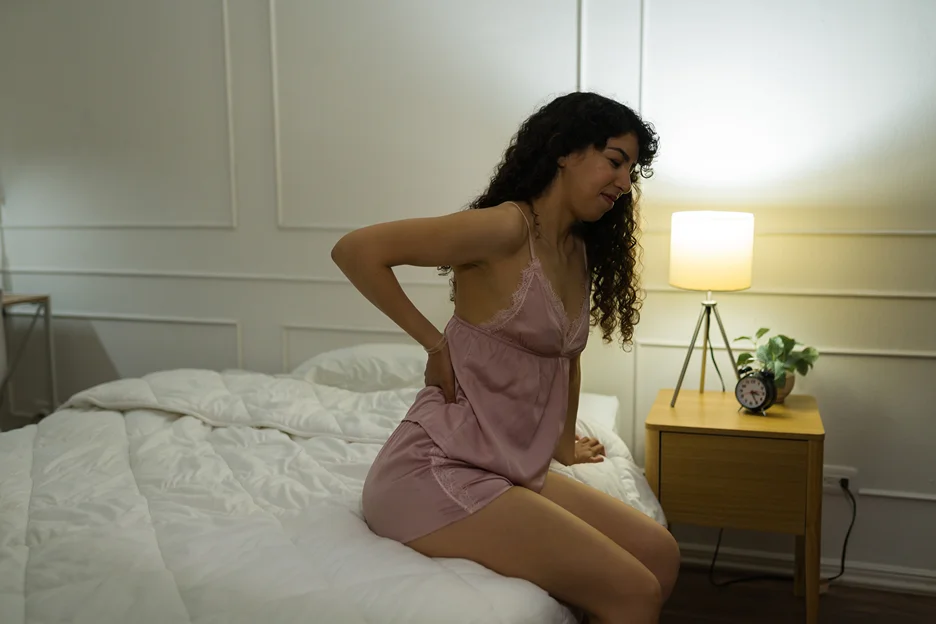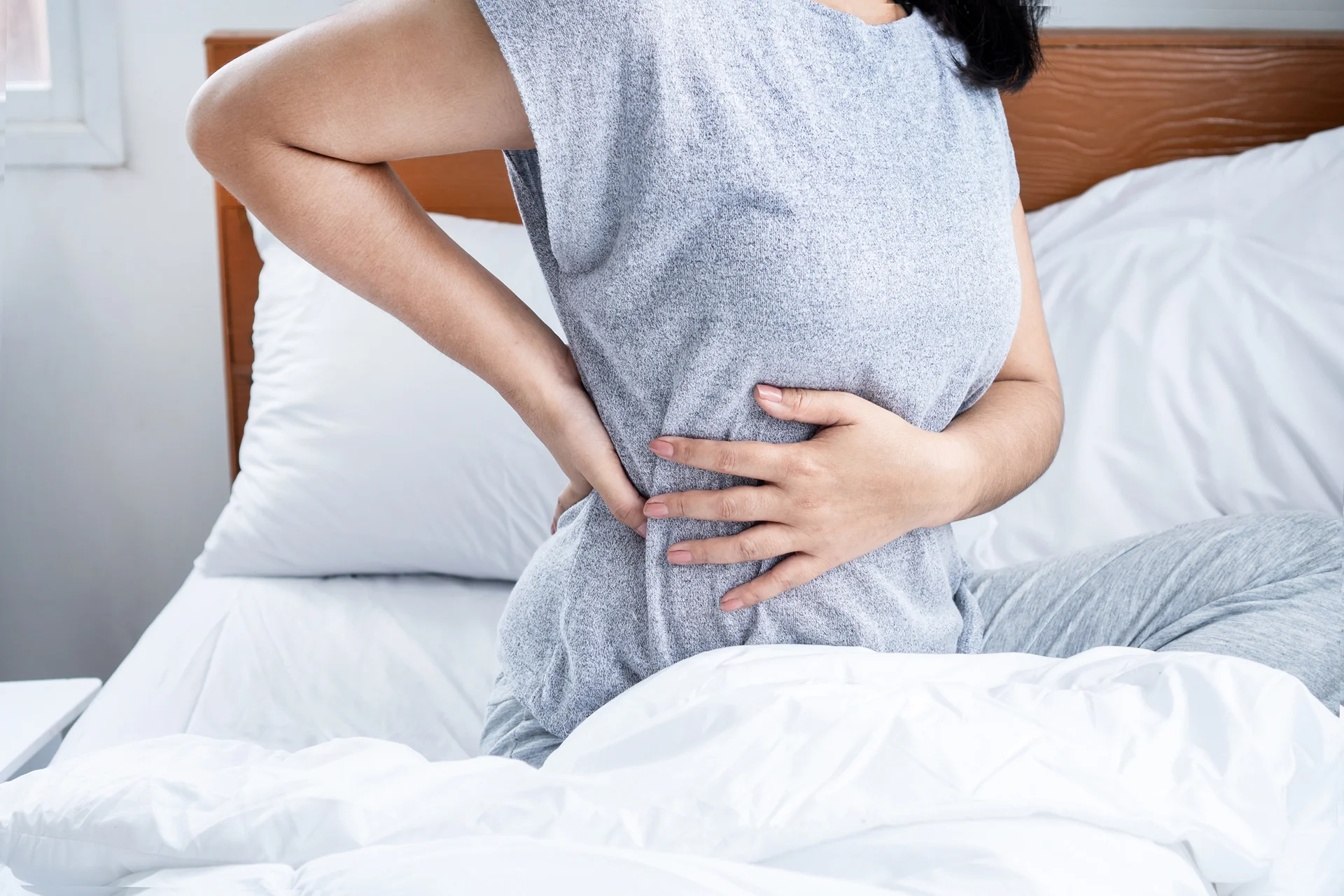The Morning Back Pain Struggle is Real
If you’re waking up with lower back pain even after a full night’s rest, you’re not alone. Many of us here at Kaly have experienced those early morning aches and stiffness too. But don’t worry – with a few simple tips and adjustments, you can get back to waking up refreshed and ready to seize the day.
Why Does My Back Hurt After Sleeping?

First, let’s talk about why lower back pain after sleeping is so common. During sleep, your back remains in one position for hours. This can put extra pressure on your lower back and cause muscular imbalances. Resisting the urge to stay in bed and gently stretching first thing in the morning can help relieve tension.
At Kaly, we also recommend addressing your sleep setup. An unsupportive mattress that amplifies pressure points or doesn’t keep your spine aligned often contributes to next-day back pain. Take some time to research and invest in a high-quality mattress designed specifically for back support.
Optimize Your Sleep Position
Your sleep position matters as well. Sleeping on your side with knees bent is often best for minimizing lower back strains. Place a pillow between your legs for extra cushioning. If you’re a back sleeper, put pillows under your knees to take pressure off your spine.
Strengthen Your Back
Beyond sleep ergonomics, regular exercise can strengthen your back and core to prevent that post-slumber tightness. Our providers at Kaly offer personalized workout plans including stretching, low-impact cardio, and core-focused routines to boost spinal health.
Kaly Has Your Back
At Kaly, your pain-free mornings are our top priority. Browse our shop for pillows, mattresses, and other sleep aids specially designed by our experts to tackle lower back pain after sleeping. And don’t hesitate to reach out – our customer support team is always ready to offer tailored advice for your situation.
With a few thoughtful tweaks, you’ll be waking up refreshed, relaxed, and ready to start your day. Sleep well and wake up strong with Kaly!
Got Back Pain After Sleeping? We’ve Got Answers.

We know you probably have a lot of questions about dealing with lower back pain after sleep. That’s why we’ve put together this handy section to provide more details on how to wake up pain-free. Read on for answers to some of the most common questions we get asked about tackling post-slumber back pain.
What are the common causes of lower back pain after sleeping?
The most common causes are strained muscles from staying in one position too long, improper spinal alignment from an unsupportive mattress, and pressure points on the hips and shoulders. Underlying conditions like arthritis can also contribute to pain after sleep.
Are there any specific diseases or conditions that could cause lower back pain after sleep?
Yes, spinal conditions like arthritis, degenerative disc disease, spinal stenosis, or sciatica can lead to pain after sleeping. Certain cancers, pregnancy, kidney stones, infections, and autoimmune disorders may also be culprits.
Can a mattress or pillow type contribute to lower back pain upon waking?
Yes, absolutely. An old, unsupportive mattress that amplifies pressure points and fails to keep the spine aligned is a prime suspect for post-sleep back pain. The same goes for flat, worn out pillows.
How might one’s sleeping position affect lower back pain?
Sleeping on your stomach or back can strain the spine over time. Side sleeping with knees bent in a fetal position is ideal for spinal support. Using pillows for cushioning is key too.
Can weight or lifestyle choices influence the occurrence of lower back pain after sleeping?
Being overweight adds pressure to the spine and can contribute to pain after sleep. Daily habits like smoking, poor diet, insufficient exercise, and excessive sitting also increase risks.
How may long-term sedentary behavior lead to lower back pain during sleep?
Sitting for prolonged periods can tighten the hip flexors and hamstrings, which then painfully spasm during sleep. Weak back muscles from inactivity also offer inadequate spinal support.
What role does age play in experiencing lower back pain after sleep?
As we age, conditions like osteoarthritis become more common and can lead to pain after sleep. Older mattresses may no longer provide sufficient support too.
How might stress or mental health contribute to lower back pain after sleeping?
When we’re stressed or anxious, we tend to tense up during sleep which strains the back muscles. Depression and chronic stress can also exacerbate pain perception.
What are some symptoms that may accompany lower back pain upon waking that should cause concern?
Watch for tingling or weakness in the legs, radiating pain, loss of bladder control, fever, or unexplained weight loss along with back pain. These may indicate a serious problem needing medical assessment.
What role does exercise or physical activity play in preventing lower back pain after sleep?
Regular exercise, especially core strengthening, keeps the spinal muscles toned and balanced to support the spine during sleep. Stretching the hips and hamstrings is helpful too.
What over-the-counter products (like creams, gels, or medications) can help manage lower back pain after sleep?
Anti-inflammatory creams or oral meds like ibuprofen can ease swelling and pain. Some find relief using heating pads or ice packs as well. Check with your doctor first about medications.
Can physiotherapy or chiropractic treatment help with lower back pain after sleeping?
Absolutely! Spinal manipulation, therapeutic exercises, and education on proper sleep ergonomics from these providers can be very effective in treating post-sleep back pain.
What preventative measures can be taken to reduce the risk of waking up with lower back pain?
Pillow placement for spinal alignment, not lifting heavy objects before bed, gentle nightly stretches, stress management, and opting for a medium-firm mattress are some key prevention tips.
When should one seek professional medical advice for lower back pain after sleeping?
See your doctor promptly if pain persists over several weeks or interferes with daily activities. Also get evaluated for any neurological symptoms, unexplained weight loss, injuries, or other concerning patterns accompanying the pain.
